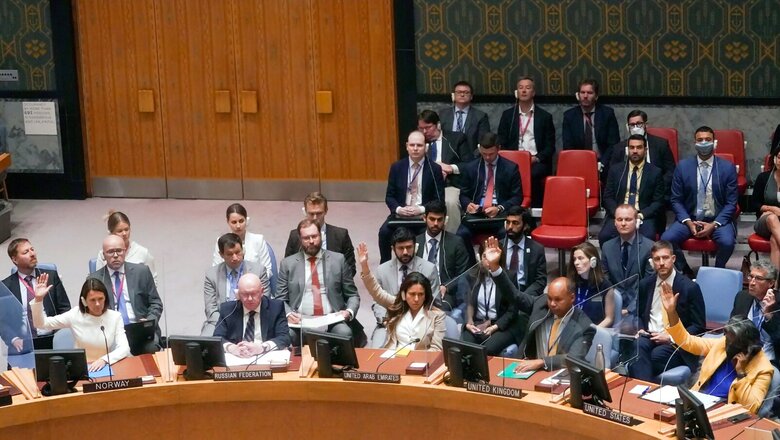
views
On the procedural vote moved by Russia against President Volodymyr Zelenskyy of Ukraine being allowed to address the UN Security Council (UNSC) virtually, India did not abstain as it has been doing on Ukraine-related issues all along. While Russia voted “No” and China abstained, India joined all other members and voted: “Yes”. Much is made in some quarters about our “Yes” vote, signifying a change in our position of not taking sides on the Ukrainian conflict and, in particular, not voting against Russia in deference to our longstanding ties of friendship with Moscow.
This would be a superficial reading of our vote. Our “Yes” did not make any difference to the outcome of the vote, as the West already had the needed nine votes to defeat the Russian move. (The permanent members cannot use the veto on procedural matters). It can be safely assumed that our Permanent Representative (PR) to the UN made an assessment of the intention to vote of member countries and this would have guided our decision. India would not have wanted to be alone with China to abstain as that risked being exploited by anti-Indian lobbies in the West, already unhappy with our neutral position on Ukraine, to project us as detaching ourselves from the “democratic” camp and increasingly joining the “autocrats”.
As it was a procedural and not a politically substantive issue, given that the Russian PR was only against Zelenskyy’s virtual participation in the UNSC session and not a physical one, India was not faced with any hard political option and chose what seems to be the best way out. Our larger position on the political aspects of the conflict, its cause, the need to create room for diplomacy and find a negotiated solution to the crisis, and, in the meantime, provide humanitarian aid to Ukraine remains unchanged. We are continuing our oil and fertiliser purchases from Russia, working on non-dollar payment channels and connectivity issues, proceeding with the S400 contract and participating in SCO military exercises in Russia. Our basic position of separating our friendly ties with Russia from our friendly ties with the West, as we do not see these ties as mutually exclusive, has not changed.
There will be headwinds ahead as the Ukraine conflict is likely to endure. More and more arms from the West are being sent to Ukraine to strengthen not only its defensive capabilities but to give it the means to inflict damage on the Russian military machine. The narrative is one of Ukraine fighting back bravely, inflicting huge casualties on the Russian military to the point of envisaging Russia’s eventual military defeat and re-establishing sovereign control over the Donbass region and even Crimea.
The extent of US military and financial support indicates that the declared strategic aim of the US to weaken the Russian military machine to the point that it cannot commit any further aggression against its neighbours, as stated by US Defence Secretary Lloyd James Austin, is being pursued. The US has committed more than $15.5 billion in security assistance to Ukraine since 2014, of which $13.5 has been committed since January 2021. The magnitude of this assistance can be comprehended if one notes that in fiscal year 2020 the US allocated $11.5 billion of military assistance to all foreign countries.
The general sentiment in Europe has also become very hostile to Russia, with any talk of compromise or negotiations seen as a Hitler-kind of appeasement. Even though Europe has come under economic pressure, especially on the energy side, the emotional support for Ukraine has not weakened. The Baltic states and Poland are leading the charge, with Zelenskyy being lionised to the point of comparing him to Winston Churchill.
The narrative is that Ukraine is defending democracy against autocracy world-wide, seeking thereby to give this conflict in Europe an international dimension which it does not have beyond the sanctions imposed on Russia that the US expects others to abide by under pain of being sanctioned in turn because of the extra-territorial application of US laws. It is in some ways a continuation of the Cold War between the West and Russia this time, defined once again as democracy and pluralism versus state control and suppression of human freedoms, with the difference that the phenomenon of globalisation makes such a division unconvincing, seeing that the biggest economic partners of major Western democracies, including the US, Japan and Germany is autocratic and human freedoms-violating China.
The irony is that the West argues on the one hand that the weakness of the Russian military machine has been exposed in the Ukraine conflict, emboldening the US and Europe, in turn, to effectively become belligerents by openly supplying arms to Ukraine to fight the Russian forces, with no fear that Russia’s massive nuclear arsenal could come into play if this proxy war continues and, at the same time, seeing expansionist Russia, if not checked in Ukraine, invading other European countries. The future geopolitical balance of Europe is supposedly at stake, which requires that Russia should not have a major direct influence in Europe as it supposedly seeks to dismantle the EU, encourage authoritarianism and dominate its neighbours.
In reality, the geopolitical balance is already very much against Russia with the Baltic states, East Europe and the Balkan states now part of NATO and the EU. With Sweden and Finland set to join NATO, the balance will tilt further against Russia. Dismissing Russian power and simultaneously feeling threatened by Russia is self-contradictory.
With the US and Europe still dominating the global system, the course of action they take on the Ukraine conflict has repercussions world-wide. Already, the conflict has aggravated a crisis of energy and food across the globe, stoking inflation and raising the spectre of global recession. India cannot but be affected by these developments. As the West feels more heat generated by its own policies in handling or mishandling the unfolding of the Ukraine crisis, India’s unwillingness to take sides will be resented. This resentment is already finding expression in mounting attacks in the Western press against India on the democracy and human rights fronts though, admittedly, this is not entirely new as India has been subject to such attacks for years, but with greater viciousness after Narendra Modi and the BJP have come to power.
At the government level, the discourse in the West is that of shared values with India as the world’s largest democracy. But at the level of the Western press and NGOs, the discourse is entirely different, denigrating India as an electoral or majoritarian democracy, or a partly free country where democratic institutions are under pressure, judiciary has become compliant, the press is muzzled, and the religious minorities are under threat from an increasingly intolerant Hindu majority. The New York Times, Washington Post, The Economist, Financial Times, Freedom House, V-Dem, USCIRF, et al, are persistently projecting this image of India. This dichotomy should be kept in mind as we shape the contours of our foreign policy on the larger international canvas.
Kanwal Sibal is former Indian Foreign Secretary. He was India’s Ambassador to Turkey, Egypt, France and Russia. The views expressed in this article are those of the author and do not represent the stand of this publication.
Read all the Latest Opinion News and Breaking News here



















Comments
0 comment